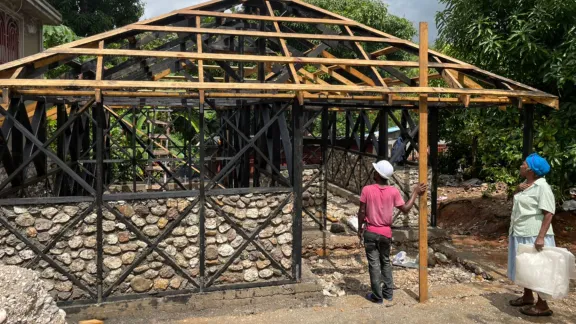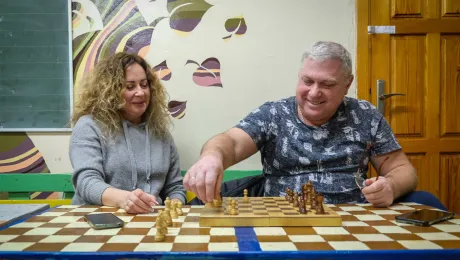
As part of the housing construction project, participants provide rocks, wood and food for the construction workers. Marie Nusia, a project participant, observes the progress on her new hurricane and earthquake resistant home. Photo: LWF Haiti
LWF World Service provides hope for a sustainable future
(LWI) - LWF World Service is constructing earthquake and hurricane resistant housing for the most vulnerable families affected by the 7.2 magnitude earthquake in Haiti last year. The country program’s housing construction design is the only one of its kind in the region and has the potential of sheltering families from the impact of these frequent disasters for up to 30 years.
A path to recovery from recurring disasters
The earthquake that struck Haiti on Saturday, August 14, 2021, left more than 2200 people dead, 12,000 injured, and more than 80,000 houses damaged. It devastated roads, bridges, hospitals, schools, churches, and public buildings. Making the situation worse, soon after the earthquake, Haiti was assailed by tropical storms.
In the wake of these emergencies, LWF World Service in partnership with Norwegian Church Aid (NCA) and Act Alliance provided humanitarian assistance to 24,430 vulnerable individuals from 4000 families. Assistance included constructing houses for 10 families whose houses were damaged in the earthquake, and cash grants to 600 vulnerable families, especially women led households, and livelihoods support.
Marie Nusia is a young grandmother living with four grandchildren. She lost her house and her nephew in the earthquake. Like many affected families they are still in mourning. As a participant of the housing project, Marie provides rock, wood protection and food for the builders to aid in the construction.
The project is unique in that it is a community rooted initiative and Marie receives some support from her neighbors. The houses are specifically designed to resist hurricanes and earthquakes. The wooden structure of each house is anchored into a concrete foundation with metal binds stabilizing the house. The roof is also built to allow strong winds to pass through. The houses are built to last 25 to 30 years, a sustainable change from the typical temporary shelter that many still must rely on in Haiti emergency responses. If repairs are needed, material can be found in the community or locally in Haiti and homeowners have been trained to ensure basic maintenance.
LWF World Service hopes to encourage partners and local communities to join efforts in creating long-term solutions that could offer more resistance and resilience in the face of recurring disasters.
The construction project is not only an effort to assist in recovery and disaster risk reduction, but also a long-term investment in the economy and livelihoods of the local community
“We received an endorsement of this model from the government which acknowledges the value of this new architecture. The construction project is not only an effort to assist in recovery and disaster risk reduction, but also a long-term investment in the economy and livelihoods of the local community” says Prospery Raymond, country director of the joint office of the LWF, Diakonie Katastrophenhilfe, and Norwegian Church Aid in Haiti. “For each of the ten houses there will be 15 workers who will train under a mason. A total of 150 community-based workers will benefit from new skills they can continue to use for new projects and to improve their livelihood.”
The earthquake also disrupted all forms of transportation leading to broken supply chains and skyrocketing the price of food and essential resources across the country. Cash grants for women led households offered urgent reprieve. With the funding recipients have been able to buy food and at times invest in their own vegetable gardens and sell the produce to create a small form of income. LWF Haiti provides cash assistance to over 600 families that receive 82 USD per family.
Auguste Gina, mother of three and participant of the cash program, made a living from a small business of selling food and vegetables from her home. The earthquake damaged her house and in the aftermath of the quake her family had to survive on the unsold food products from her business. “I lost everything in the earthquake, my house was destroyed, and had nothing left. With this money I will try to set up a small business.”
LWF/T. Rakoto


